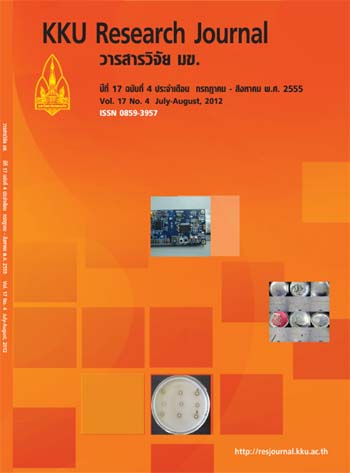Study on optimal conditions for reducing sugars production from recycled paper sludge by diluted acid and enzymes
Main Article Content
Abstract
Recycled paper sludge (RPS) is basically made up of secondary poor-quality non-recyclable paper fibres (fibres too short to be retained on fibre screens and paper machines). The high lignocellulosic content of this sludge material offers therefore an opportunity as feedstock of bio-products. The effects of various operating variables including pretreatment temperature, pretreatment time, the concentration of diluted acid and the solid-to-liquid ratio and the enzymatic digestibility were optimized using response surface methodology. Recycled paper sludge was dried and milled into small pieces by blender, ultracentrifugal mill and disc mill. Paper sludge was pretreated using aqueous-diluted acid solution at high temperatures to enable production of the maximum amount of fermentable sugars for enzymatic hydrolysis. The results showed that 1.5% (w/v) recycled paper sludge was pretreated by diluted sulfuric acid at 135ºC under pressure 15 lb/in2 for 30 min producing highest yield of reducing sugars while 0.1 M hydrochloric acid and 0.25 M acetic acid pretreatment produced lower yields of reducing sugars under the same conditions. The optimal reaction conditions, which resulted in an pretreated disc milled-paper sludge with 0.1 M sulfuric acid and enzymatic digestibility of 66.67 %, were found to be at pH 5.5, 55 ºC, 24 h. The effects of different commercial cellulases and the additional effect of a non-cellulolytic enzyme, xylanase, were also evaluated.
Article Details
How to Cite
Kulsuwan, N., & Kongkiattikajorn, J. (2017). Study on optimal conditions for reducing sugars production from recycled paper sludge by diluted acid and enzymes. Asia-Pacific Journal of Science and Technology, 17(4), 622–629. retrieved from https://so01.tci-thaijo.org/index.php/APST/article/view/83273
Section
Research Articles


